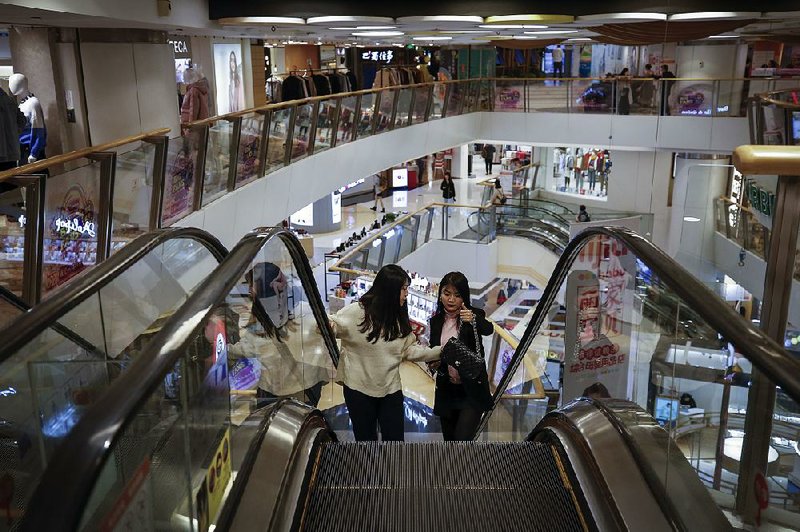The U.S. and China are close to finalizing sections of the first phase of a trade deal that President Donald Trump and China's Xi Jinping hope to sign at a summit in Chile next month, the Office of the U.S. Trade Representative said.
During a call Friday morning in Washington with Chinese Vice Premier Liu He, U.S. Trade Representative Robert Lighthizer and Treasury Secretary Steven Mnuchin made progress on "phase one" of the agreement that Trump announced earlier month, Lighthizer's office said in the statement.
"They made headway on specific issues and the two sides are close to finalizing some sections of the agreement," the statement said.
Trump has said he wants to sign the first phase of a trade deal with China at a Nov. 16-17 Asia-Pacific Economic Cooperation summit in Santiago, Chile. But when he announced the phased deal earlier this month, he also conceded the two sides still needed to work out many details and to put it in writing.
"We're doing very well with China" and "they want to make a deal very badly," Trump told reporters as he left the White House on Friday.
There are still major questions over whether the second phase of a deal will ever happen. The first phase is expected to see China resume purchases of U.S. agricultural products at a level last seen before the trade wars started, in return for a pause in further U.S. tariffs. Officials have said it will also include Chinese commitments on intellectual property, currency provisions and promises of some regulatory changes related to agricultural imports.
In a sign that not all issues had been resolved, the trade representative's office said discussions "will go on continuously at the deputy level" with Lighthizer and Mnuchin due to speak with Liu again "in the near future."
White House officials were nevertheless eager on Friday to continue portraying progress in bringing at least a pause to the trade wars that have unnerved financial markets and businesses around the world for more than a year and contributed to a slowing U.S. economy.
"We had excellent talks this morning. That will continue," Peter Navarro, a White House trade adviser, told Fox News.
"This is not one-and-done in phase one. This is phase one hopefully mid-November and then just keep rolling along," he said. "There's no chance that if we get all three phases of the deal that it will be watered down in any way."
The trade negotiators' call came just a day after U.S. Vice President Mike Pence gave a long-awaited speech excoriating China for its authoritarian rule and backing pro-democracy protests in Hong Kong. The speech prompted an angry response from China's Foreign Ministry where a spokeswoman urged Pence and the U.S. to focus on its own problems.
Pence on Thursday gave a speech in which he criticized China's actions against protesters in Hong Kong while calling for greater engagement between the world's two biggest economies. He said the U.S. stands with demonstrators in Hong Kong and accused Beijing of curtailing the rights and liberties of the city's residents.
Hua Chunying, a spokeswoman for China's Foreign Ministry, blasted Pence's "arrogance" and said no force would stop the country's progress. She accused him of seeking "to disrupt China's unity or internal stability" and called Hong Kong, Taiwan and the far west region of Xinjiang "internal affairs."
"The U.S. has already abandoned and cast aside its morality and credibility," Hua said. "We hope these Americans can look at themselves in the mirror to fix their own problems and get their own house in order."
Pence's most stinging criticism of China was indirect, in remarks targeting Nike Inc. and the NBA.
"Nike promotes itself as a so-called 'social-justice champion,' but when it comes to Hong Kong, it prefers checking its social conscience at the door," Pence said.
Representatives for Nike didn't respond to requests for comment.
He accused the NBA of "siding with the Chinese Communist Party and silencing free speech." The league apologized after an executive of the Houston Rockets issued a tweet supportive of Hong Kong protesters, angering Chinese authorities and many NBA fans in the country.
"The NBA is acting like a wholly owned subsidiary of the authoritarian regime," Pence said.
In an Inside the NBA segment Thursday, NBA Commissioner Adam Silver responded to a video clip of Pence's comments without referring specifically to the vice president.
"We're gonna double down on engaging with the people of China and India and throughout Africa -- around the world, regardless of their governments," he said. "Certainly, if we get to a point where the U.S. government tells us we shouldn't be doing business in a certain territories or countries, we won't."
Unrest in Hong Kong has underscored the heated tensions as many U.S. lawmakers are pressing for legislation to support pro-democracy protesters despite a threat of economic retaliation from China.
"Markets tend to assume the administration's China policy is monolithic, swinging either hawkish or dovish based on the president's moods, but that's not really the case," Miller said. "Since late August the White House has certainly turned more dovish on trade, but on the national security side, hawks continue to run the show."
Under the terms of the partial trade arrangement reached earlier this month, Chinese spending on U.S. farm goods will scale to an annual figure of $40 billion to $50 billion over two years, according to the White House. China would also agree to certain intellectual-property measures and concessions related to financial services and currency.
In exchange, the U.S. delayed a tariff increase that was scheduled for Oct. 15 -- to 30% from 25% on about $250 billion of Chinese imports. More duties on Chinese products, targeted for Dec. 15, haven't yet been called off.
Information for this article was contributed by Eben Novy-Williams and Andres R. Martinez of Bloomberg News.
Business on 10/26/2019
